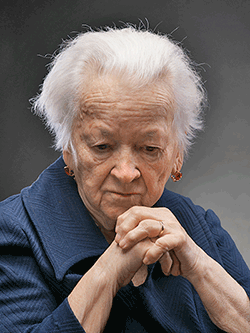Assisting Vulnerable Adults in Need of Support
A year ago, an Arizona man we’ll call “Joe” was in a bad spot.
With no medical insurance, he had no access to diabetes medication. Without medication, his eyesight was failing. Because of his vision problems, Joe lost his job.

By the time Adult Protective Services (APS) was notified of Joe’s case, he had almost completely lost his sight and was very distressed. His apartment was dirty, as he could no longer see to clean it. The walls were lined with stacked boxes he used as a guide from his bedroom to the door.
On the second visit to his home, the APS investigator discovered Joe had suffered a massive stroke. The investigator called an ambulance who rushed Joe to the hospital. The investigator followed and briefed the hospital staff of Joe’s situation. They performed emergency surgery to address the stroke and later performed eye surgery to address his failing sight.
After three months of hospitalization and rehabilitation, Joe was able to return home to his apartment where he was moved to the ground floor as requested by APS. Although his savings account was depleted, he did begin receiving Supplemental Nutrition Assistance (SNAP) and coverage for medication after obtaining assistance through the Arizona Health Care Cost Containment System (AHCCCS). APS was also able to step-in and assist with utility payments and prevent eviction from his apartment.
APS’s involvement in Joe’s life saved his sight, temporarily helped to address his utility payments and prevented eviction. He was full of happy tears as he informed the investigator he feels much less stressed because of the help Adult Protective Services provided.
This is a true story from an APS case file. Unfortunately, stories like this are far too common. APS, a program in the DES Division of Aging and Adult Services (DAAS) reports self-neglect, or the inability to care for oneself, is the most common type of call received. In other cases, vulnerable adults (individuals 18 years of age and older) may be victims of neglect by caregivers, physical, emotional or sexual abuse or financial exploitation. As we continue to focus on seniors during Older Americans Month, we turn our attention to crimes against the elderly.
The National Council on Aging (NCOA) estimates that five million seniors experience abuse in the United States every year. Approximately 1 in 10 Americans 60 years or older have experienced some form of abuse, but experts estimate that only one in fourteen cases are reported. Elders who have been abused have a 300% higher risk of death compared to those who have not been mistreated.
Elders who are victims of abuse may display the following:
- Unexplained bruises, broken bones or abrasions
- Unusual withdrawal from normal activities, unusual depression, strained or tense relationships with family or caregivers
- Sudden changes in financial situations – i.e., bank accounts or credit cards show unusual spending habits
- Unattended medical needs, poor hygiene, and unusual weight loss
The main perpetrators of other types of abuse tend to be children, grandchildren and spouses of the victims. APS works closely with law enforcement. If officers feel the mistreatment rises to the level of a crime, the alleged perpetrator could be arrested.

Case workers in APS have made significant strides protecting the vulnerable. In Fiscal Year (FY) 2016, APS investigated 11,629 cases involving elder abuse, neglect, self-neglect, or financial exploitation. This represented a 16 percent decrease from FY2015. APS credits specific efforts, including the expansion of tools for data driven performance management, improved decision-making and a collaborative partnership with APS colleagues across the state for the improvement.
The APS Financial Exploitation Unit handles the most complex financial exploitation allegations across the state. These investigators are specifically trained to conduct financial analysis. They work closely with local law enforcement including the Arizona Attorney General’s Office and the Office of Inspector General (OIG) to hold alleged perpetrators accountable for their actions. According to the National Council on Aging (NCOA), financial abuse and fraud costs older Americans $36.5 billion per year.
If you suspect elder abuse, you can file a report with APS either by phone or online. To make a report by phone, call 1 (877) SOS-ADULT or 1 (877) 767-2385 Monday-Friday 7:00 a.m. - 7:00 p.m. / Saturday - Sunday and state holidays 10:00 a.m. - 6:00 p.m. Your call we be forwarded to a trained Central Intake Unit (CIU) specialist who will ask you a series of questions. You can file a report anonymously, however, the CIU specialist will be unable to contact you if additional information [regarding your report] is needed.
You can also file a report online. This option is available 24 hours a day, seven days a week. Once received, any report meeting investigative criteria (abuse, neglect and exploitation of a vulnerable adult will be forwarded to the local field office for investigation within eight [8] business hours.
Vulnerable adults have the right to live a life free from abuse, neglect, and exploitation. When they lack the capacity to meet their basic needs, they should be provided assistance to ensure their safety and well-being. It takes collaborative partnerships between APS, families, and community partners to ensure vulnerable adults are protected.
By Vance Phillips

